Jaguar introduced a 2+2 version of its iconic E-Type in 1966 to add versatility to the range. Many enthusiasts questioned the decision, but sales results proved it wise. The 2+2 remained ignored for years by the classic world, but they have developed a strong following due to the ability to seat four people. This 1969 model shows promise and could be a straightforward proposition to return to active duty. If you feel tempted, you will find it exclusively here at Barn Finds Auctions.
Jaguar produced the E-Type for fourteen years. This E-Type wears Black that looks remarkably good for its age. Due to the accumulated dust, making a definite call on its condition is difficult. However, it would be worth treating this classic to a wash, wet sand, and polish before considering spending a cent on a cosmetic refresh. I think it could spring a pleasant surprise or two with that approach. The panels are free from visible rust, including prone areas like the rockers, lower rear quarter panels, and rear valance. The lack of visible significant corrosion across other aspects of the vehicle makes it possible that the floors are rock-solid. The chrome trim and wire wheels look like they would respond positively to some old-fashioned elbow grease and a high-quality polish, and the glass looks excellent. If my assessment is correct, it will take more time than money to have this classic presenting nicely.
Powering this E-Type is one of the most magnificent engines to find its way under the hood of a classic car. The 4.2-liter DOHC six is a giant killer. It may only produce 245hp and 263 ft/lbs of torque, but it uses both to great effect. The journey down the ¼ mile would take 15.4 seconds, with the sweet six running out of breath at 134mph. The performance figures are slightly down compared to its predecessors, but this E-Type would be an accomplished Grand Tourer. The supplied photos show no evidence of major fluid leaks or problems, which is encouraging for potential buyers. It is unclear whether the car runs, but it may be the case that a fuel system flush and basic maintenance could see this beauty roar back to life.
The interior story of this 2+2 is similar to its exterior. It is complete, and my approach would be to treat it to a deep clean before committing money to a refresh. The leather on the driver’s seat has holes, but the passenger and back seats might benefit from a high-quality conditioner. The carpet screams for a clean, and the shifter knob is missing. Other trim items may require replacement, but it is possible that the new owner will need to spend significantly less than the $7,000 it would usually cost for a total retrim. The dash and bright trim items present well, with no evidence of corrosion or physical damage. One welcome option introduced with the Series 2 model in 1968 was air conditioning. The original owner ordered this classic with that feature, while a radio/cassette player provides tunes on the move if the occupants tire of the song being sung by the six under the hood.
While the 2+2 version of Jaguar’s E-Type didn’t sell quite as well as the Roadster, it easily outsold the conventional Coupe. In 1969, 4,286 buyers selected it in left-hand-drive form. Considering total new car sales in North America at that time, that makes it a relatively rare beast. A spotless example will consistently command $60,000 in the current market, while clean driver-quality cars easily top $40,000. It is worth noting that values are climbing consistently, making an E-Type 2+2 a promising long-term investment. Hmm, a classic that offers a rewarding driving experience and could turn a future profit. I can’t think of a downside to that scenario. Can you?
- Location: Elkins, West Virginia
- Mileage: 53,028 Shown, TMU
- Engine: 4.2-liter Inline-6
- Transmission: Manual
- VIN: F1R40328
- Title Status: Clean
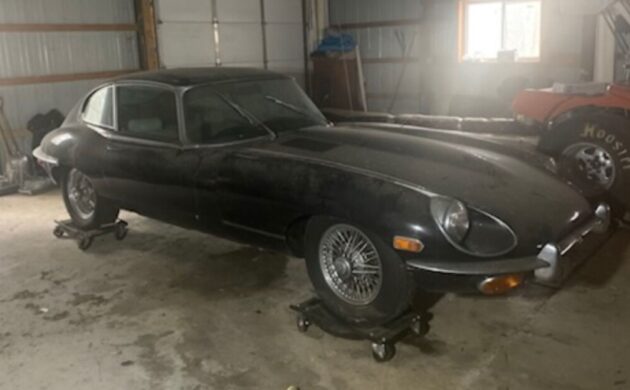
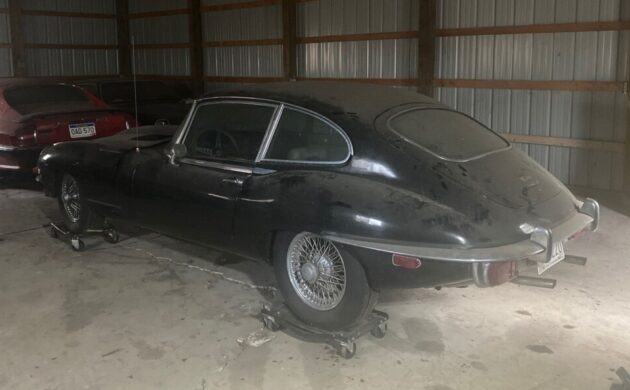
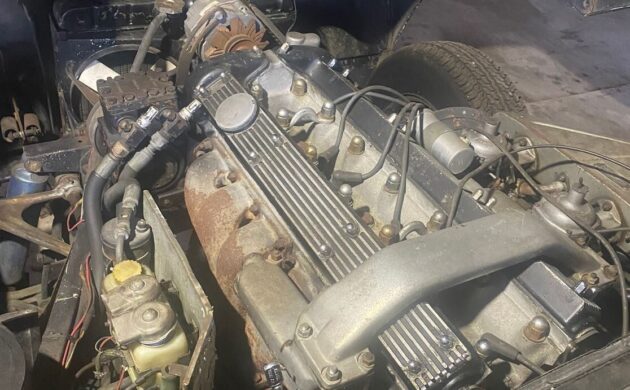
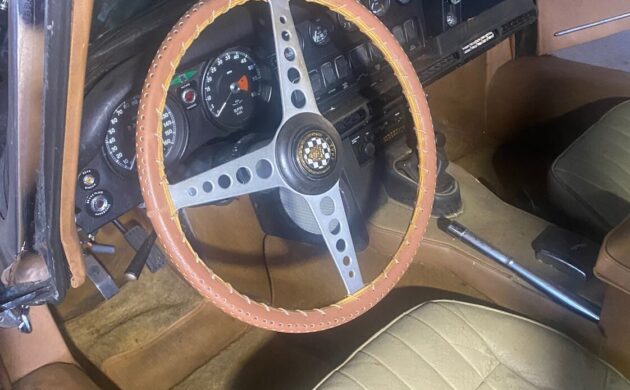
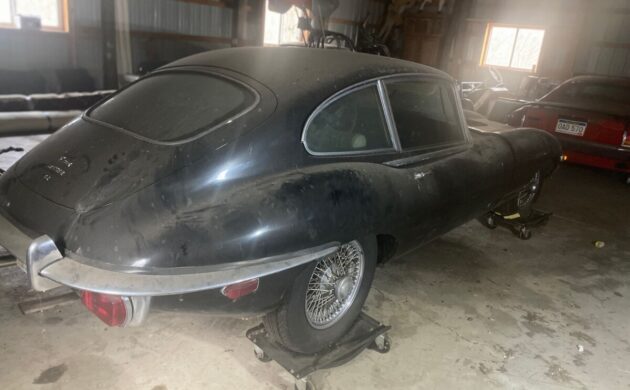
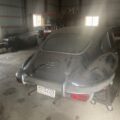
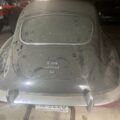
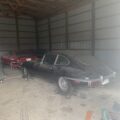
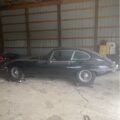
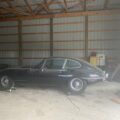
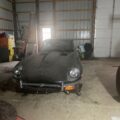
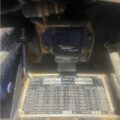
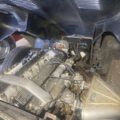
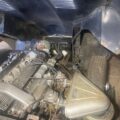
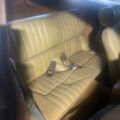
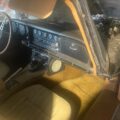
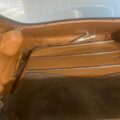
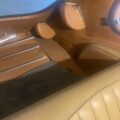
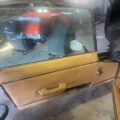
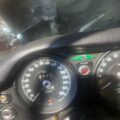
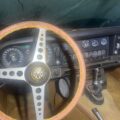
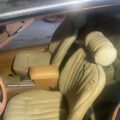
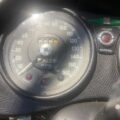



What possessed you to make this statement? “Jaguar produced the E-Type for fourteen years, with Black and British Racing Green as the only colors available during the entire production run.”
Hard to say where that information came from, and in actuality, you could get one in any color if you agreed to wait. I have had four of these cars, and one was black with black guts.
I have a ’69 2+2(37 years) that was delivered in Regency Red with Black interior, 4-Speed and A/C.
This Jag was a nice looking convertible, but an ugly coupe.
No, the coupes are gorgeous. It’s this 2+2 with its bulbous roofline that you find unappealing. Two completely different cars.
This is probably the least expensive E type you can own. 2 + 2 styling a little awkward and an automatic, I believe Carbs were changed too. Can any of the E type experts comment and educate? I would love to own this jag but I need to sell my MK 1 sedan 1st. I know I’m a Jag bottom feeder but at least I’m still in the game.
Slomoogee – why would you consider yourself a bottom feeder? I have had 4 Mk1’s and I prefer them to the Mk2. They don’t handle as well, less power and not as “classy”, but I love them for those very traits.
As for the Series 2 2+2, they run the Stromberg 1.75 CDSE which became the carb standard going into the 70’s (smog carb) for all Jags. Gearbox was a 4spd or an automatic, ac was an option as was steel wheels at first, then wires became the option in the end.
The above car must be a late production 69 as it has the 70 cross-over pipe at the rear of the cams. But it would have to be really late as mine is a July 69 build and doesn’t have it. The $20k this one is sitting at to me is a good price for what I would call a “scruffy” driver. At $30k I’d expect a grade 2 car which this one might clean up to be (cosmetically and mechanically) with a bit of elbow grease and a few weekends if there are no major problems.
If I remember correctly, $60k is the record for a 2+2 to date but it was an exceptional car (they had that in the restoration alone if I remember)
JagManBill: If your July ’69 E Type does not have the crossover pipe coming from the rear exhaust, it should. It means one of two things: either someone removed it for the extra power (not an uncommon modification) or your car is a Canadian variant.
The crossover pipe in American variants actually started as of January 1, 1968 with the unofficial Series 1.5. In 1970 you had a switch to both rear and front exhaust manifold smoke heating the inlet/intake manifold over the middle of the engine. Those 1970-71 variants also had the lower compression (7.9:1), wider valve clearances, ash recovery cannister, lower gearing to disguise the power loss…
With the twin Zenith-Strombergs you actually have as much power as with the triple SUs, believe it or not…as long as you get rid of the cross-over pipe. The Z_Ss atomize the fuel more finely and are thermostatic. This, combined with the more powerful distributor, which zaps the mixture more aggressively, gives you a more efficient burn and less exhaust back-pressure.
Laurence, I’ve seen many 69’s without the cross-over pipe. As a matter of fact, I have never (till this example) seen a 69 WITH the pipe. My cam covers are full ribbed – meaning there is no cut out for the cross over and I have “standard” exhaust and intake. Also, the car was new delivered in Little Rock AR and I had (up till our house fire) full documentation on the car from new. I am the 3rd owner. The only “repair” or mod work done to the car was a side-swipe in mid 70 on the left quarter with the original owner. They sold the car in late 71 with 22,000 miles on the clock. Can you believe they traded the car back through the original dealer for a 450SL? Second owner was an Attorney. He did nothing to it other than drive it as his DD for 2 years (original dealer serviced) then off and on for 2 as his children were getting too big for the back seat. I got it with 47,000 on it. I put another 210,000 on it between 75 and late 91. Its was torn down for a rebuild at that point and then was severely burned in a 08 house fire. I am starting restoration this Spring.
JagMan Bill: All American ’68s and ’69s came with a REAR cross-over from the REAR exhaust manifold only. They did not have the cam cover indentations that were to be found on the ’70-71s, which had a thicker BLACK crossover pipe that took hot exhaust over to the inlet/intake manifold via the middle of the engine. Many ’68s and ’69s have had the crossover pipe removed to get some more power. Only the ’69 Canadian cars came from the factory with no crossover, because Canada did not officially adopt American regulations until 1970.
The 2+2 Coupe is 10 inches longer than the standard and has magnificent lines that make her slinky and sleek. And, then you drive one…! To each his own…
A bit optimistic on the value- A nice clean unit ready to go just went on BAT and was only bid to 33K. No one I knew in the Jag enthusiasts group ever held them in very high regard- that tall roof line really ruined the look.
I know just enough about these cars to get me in trouble trying to get the carbs to sink up I wish it was closer than the 2300+/- miles away I would consider getting it just for something to Tinker with than try to sell it for a profit
When I bought mine(37 years ago), my 4.2 had been retrofitted with the triple SUs(part of the reason I did). I learned an old trick from my dad, who had a ’50 Mark V Drophead with a 3.5 litre and double SUs. I use a stethoscope to sync carbs as the ear is better than setting up vacuum gauges and once mixture is set, leave it, AT fluid to lube dampers…purring and prancing!
I too own a 69 2+2 in old english white with biscuit interior, 4spd with a/c and wire wheels. Owned it since July 21, 1975. It will “seat” 4 people, so long as they are all really short. What the 2+2 gives you is ample front seat room for a tall driver/passenger (I’m 6’4). You can stuff small crap in the back seat. The rear seat back is actually split so you can pull it forward for more rear cargo room. What this also does when its forward is it makes the car look like a 2 seater. It also gives you a nice out of site storage area under the squib.
Values are starting to climb, but only because OTS and FHC’s are getting stupidly high and the 2+2 is a cheap entry into the E Type. Yes they were the lowest produced E Type which does make them rare. It doesn’t mean that rarity is returning in value…yet. But give it time….
I’m 6’4″ too, have same configuration and the leg tunnel is wonderful as well as headroom! 10 extra inches of length give the model a sleek appearance as opposed to stubby reared coupes and roadsters…
Jaguar 2+2 is a manual not automatic.
Brian, there were automatics…bunches of them.
Take the boat anchor motor out and stick an LS motor in its place. Then you can drive it anywhere without the worry of whether or not the tow truck can come and get you.
I suppose you could use a Dodge slant six, too, and have better weight ratio than the LS elevator weight counter balance…
As a 37 year owner, the 2+2 pictured IS A 4-Speed MANUAL transmission 1969 E-Type. Note stick shifter(missing knob) and a clutch pedal in the photos. The automatic transmission had a distinct T-Handle shift lever. The carbs are standard Zenith Strombergs for the year manufactured and don’t appear to have been changed out.
I had a coupe 2+2 and loved it. Was quieter to drive, faster at top speed and handled better because it was stiffer. The convertible was better for catching the girls though.
Black and green only?????? Color blind or are those your favorite colors?
My first jag was a series 2 2+2. Rolled it. ,Then got a nice 1964 OTS. Rolled that one as well. Got another 64 to use to resurrect one drivable example. It was the early 70’s and e types were just rusty used sports cars. Never got the third one on the road. I was a teenager and grossly overestimated my driving skills. I kept the second rollover car, and sold them both a few years later for what was a good profit at the time. Of course I regret all that to this day! Ah, the stupidity of youth. Hindsight……
Priceless Examples of Exuberance…!!! Not to be downplayed nor regretted.
Bravo, my good man, Bravo and stay well for more.
Remind me NOT to let you drive my Jags ” crash”.
I sold 2 E-types in the last year that I’ve owned for 35 plus years. A ‘68 OTS restored roadster and a ‘69 coupe 2+2 (33K original miles) with identical options including A/C, P/S, larger radiator & brakes. The 2+2 with options was the most expensive E type. The entry cost is expensive and these cars can bankrupt even the most resourceful but parts are readily available.